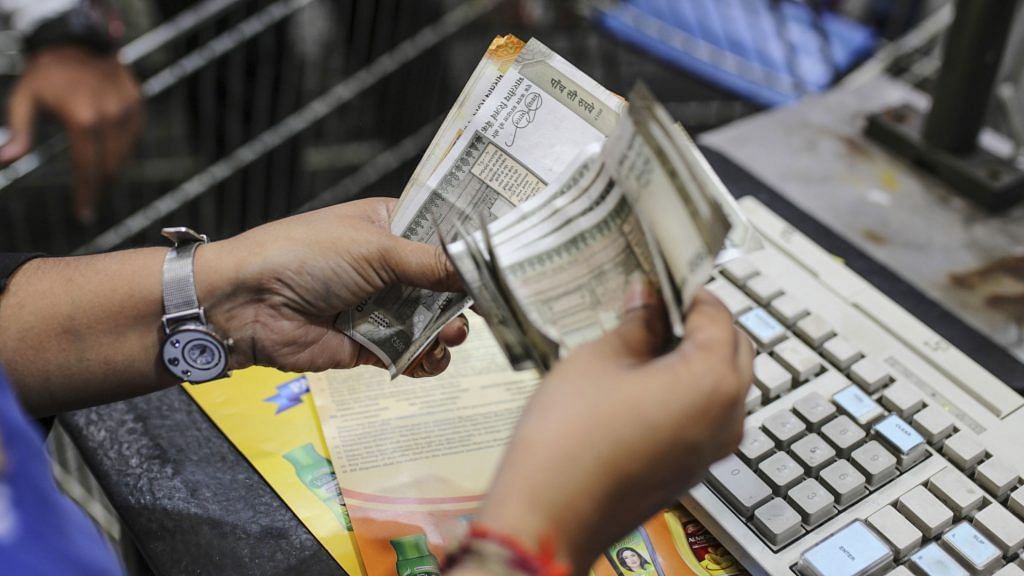New Delhi: The stage seems to be set for a stormy meeting of the Goods and Services Tax (GST) Council Thursday with both BJP and non-BJP ruled states ready to oppose any plans by the central government to avoid paying the promised compensation to the states.
In a virtual press conference organised by the Congress Tuesday, Punjab Finance Minister Manpreet Singh Badal called the central government’s attempt to deny the states their rightful compensation as tantamount to “sovereign default” and said the Narendra Modi government has no respect for the Constitution.
He added that Congress-ruled states will oppose any such plans by the Centre and demand that the compensation is paid in full to the states.
Speaking to ThePrint over phone, Bihar Deputy Chief Minister and state finance minister Sushil Modi said the central government has a moral commitment to pay the compensation to the states for two more years.
“I don’t think states will agree that they should borrow to meet the shortfall. Then what are the options? The central government can borrow and compensate the states or money can be transferred from the Consolidated Fund of India. Another option is the cess fund can be increased by raising the cess on items. But raising tax rates will not send the right message at this time of the pandemic,” Modi said.
At the time of the rollout of the GST in 2017, the central government had assured the states of full compensation for any losses arising due to a transition to GST for a period of five years. The compensation would meet the shortfall in revenue to the states assuming a 14 per cent growth annually in GST revenues.
States will be compensated for any shortfall in GST revenues and the calculations would be based on an assumption of a 14 per cent growth in revenues annually, according to the provisions of the GST Compensation Act.
The 101st Constitution Amendment also has a provision of compensating states for a period of five years from implementation of GST in July 2017. This means that states have to be compensated until July 2022 for any losses.
However, a sharp fall in the GST compensation cess last fiscal on account of the economic slowdown saw the Centre delaying payments to the states. In the current fiscal, the Covid-19 pandemic has further reduced the corpus of the fund.
GST compensation cess proceeds are collected in the GST compensation fund from which payment is made to the states.
Also read: States want Modi govt to release grants and GST dues, raise borrowing limits to fight crisis
‘Left at the mercy of the revenue secretary’
“It is very sad that the Union revenue secretary goes to the attorney general and gets a view that the central government is not bound by the Constitution to pay compensation. The promise of compensation to states is part of the Constitution. If you are not able to honour it, then it amounts to sovereign default,” said Badal.
He added that states have been left at the “mercy” of the revenue secretary.
“We are left at the mercy of the revenue secretary… writing letters asking that can we get our compensation quickly. We are being forced to front load our borrowings to pay our employees,” Badal said.
In a press conference earlier this month, Finance Minister Nirmala Sitharaman had said that the attorney general’s opinion that was sought by the Centre will be discussed in the meeting of the GST Council.
ThePrint reached a finance ministry spokesperson via phone calls, but he declined to comment on the minister’s statements.
Last month, Kerala Finance Minister Thomas Isaac had termed the Centre’s move as “brazen betrayal of federal trust”.
According to news reports the hearing before Standing Committee on Finance , Centre has taken the stand that GST Compensation can’t be paid and present arrangements be revised by Council. Such a brazen betrayal of federal trust! Convene the Council meeting immediately as promised
— Thomas Isaac (@drthomasisaac) July 29, 2020
He was reacting to reports that Union Revenue Secretary Ajay Bhushan Pandey had informed the standing committee of finance that the Centre can’t pay the GST compensation.
In 2019-20, the central government paid a total compensation of Rs 1.65 lakh crore to the states. However, the total amount collected through the cess was Rs 95,444 crore. The gap in the compensation was met through transfer of funds from the Consolidated Fund of India — arising out of transfer of integrated GST revenues to the fund in 2017-18.
‘Modi govt has no respect for Constitution’
Badal pointed out that the transfer of GST revenues to the Consolidated Fund of India was “misappropriation” of revenues that was even flagged by the Comptroller and Auditor General of India. He added that Rs 88,000 crore of this amount still remains with the Centre and can be used to pay the compensation.
“The Modi government has no respect for the Indian Constitution, for the CAG, for the minutes of the GST Council.”
He also said that Punjab has received compensation only until March 2020. The government owes Punjab Rs 4,400 crore. It is a big amount for a state like us, Badal said.
He added that he considers the central government’s move to withhold compensation payments as a pressure tactic and the Centre could be looking at increasing the tax rates.
Congress leader Rajeev Gowda questioned how the central government can talk about cooperative federalism when they practise coercive federalism.
Also read: GST collections in June stand at Rs 90,917 crore, 9% lower than last year
